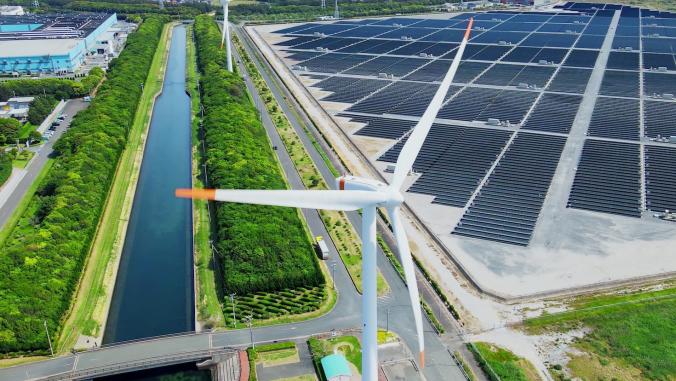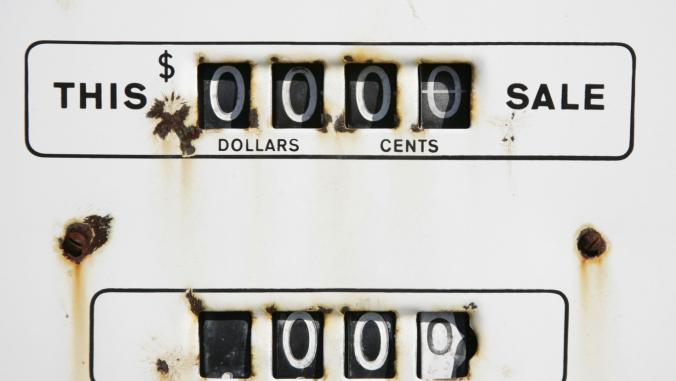Interserve shows how to build green BHAGs
The outsourcing and construction services giant spins new resource use and carbon emissions targets without using industry initiatives as a pattern.

A growing trend over the past couple of years, spurred by the private sector's role in supporting the Paris Agreement in 2015, has been for whole industries to work together in pursuit of global environmental and sustainability targets.
More than 100 multinationals have joined the RE100 initiative pledging to source all their electricity from renewable sources — IKEA, Coca-Cola and Facebook, to name three — and thousands of companies are already disclosing their climate change risk date through CDP. Science-Based Targets (SBT), too, are increasingly sought by corporates, with nearly 300 having set or had approved their goals for Scope 1, 2 and 3 emissions reduction.
Boasting revenues of around $3.8 billion per year, outsourcing and construction services giant Interserve therefore might be considered another prime candidate for joining these global initiatives. After all, its latest sustainability report demonstrates both significant ambition as well as existing progress towards environmental targets.
Since 2013, Interserve has reduced its global construction waste by nearly 40 percent, its carbon intensity by 18 percent, its water intensity by 14 percent and its business travel by 17 percent, according to last week's SustainAbilities report. Moreover, the company's U.K. operations are already powered by 74 percent renewable electricity, helping to ensure its total carbon emissions fell 18 percent in just four years.
Yet while Interserve is challenging itself to purchase 100 percent renewable power in future, it has no plans to join the RE100 initiative, according to group sustainability manager Laura Spiers, because electricity doesn't constitute one of Interserve's more pressing environmental impacts. The same goes for officially setting a Science Based Target — a move the company is mulling but has yet to reach a decision on.
Green at the core
"We have considered some of those elements, but I guess we have been looking more at setting the big, hairy audacious goals, with the view that this then stimulates our business and gets us something to work towards," she said. "We haven't applied the SBT methodology yet, but if we did it I think we would probably come out with a target which is less ambitious than what we've got. They [SBT targets] are good and useful for businesses wanting to set something that is meaningful, but if you are heading in the right direction anyway, I'm not sure they do anything else outside having simply having a target."
The company has responded to CDP's global sustainable forestry disclosure program, as well as last year joining the Prince of Wales' Corporate Leaders' Group to help promote action on climate change.
However, Tim Hayward, Interserve's chief financial officer and sustainability lead, concedes a degree of skepticism towards wider, externally set green targets.
"There can be a risk with science sustainability plans of them being a bit 'by sustainability practitioners, for sustainability practitioners,'" he explained. "A lot of time and effort can be spent on the sustainability methodology, and I think our thrust has always been more on the practical business indications. I've spent a lot of time talking to sustainability organizations about the need to sometimes step away from their anoraks and get down and dirty with business. And similarly, with financial people, telling them to step away from their spreadsheets and connect with their hearts and souls a little bit. That might be one example of where we have stepped away from a sustainability methodology in order to get something that resonates for our business."
Interserve's green credentials are an essential part of doing business.
For Hayward, Interserve's green credentials are an essential part of doing business. Of course, every reduction achieved in waste and water use delivers direct financial savings for the company, but there are plenty of wider benefits. It also has a major impact on the ability to attract and retain employees to the company's 80,000-strong workforce, he argued.
And, as a major part of Interserve's business is its contracts to manage the estates of companies, public bodies and government departments, strong environmental credentials are critical to its competitiveness. For example, the company stewards the Ministry of Defence's huge training estate, which — covering around 3 percent of the U.K.'s land mass — includes numerous with sites of special scientific or environmental interest, explained Hayward.
Clearly, as a major contractor offering support services across a range of sectors, including aviation, education, health, energy and leisure, offering strong green credentials plays a major part in securing business.
"A key part of our contract with the MoD is to be environmentally sensitive in key stewarding roles, and a key part of our proposition for the client is to help them look good in that area," he said.
Flipping buildings
Yet on top of working with clients to improve the efficiency and sustainability of their estates, Interserve is also dependent on a vast supply chain of materials through its construction and design arm. By necessity, therefore, the company is also strongly focused on boosting sustainability outside the confines of its own operations in order to improve long-term resilience.
Globally, 80 percent of the company's timber use in construction was either FSC or PEFC certified last year, while 89 percent of its products containing palm oil were accredited to RSPO standards. Interserve also has set up an Energy Centre of Excellence to promote best practice on efficiency among its clients, and 54 percent of its suppliers are covered by its own sustainability code of conduct.
Still, the company recognizes the need to go much further and last year commissioned an analysis of the carbon emissions arising from its supply chain in its support services business. It showed Interserve's own emissions were only one-tenth that of its supply chain, which accounts for 300,000 tonnes of carbon. For the year coming, therefore, the company plans to engage with its top 20 suppliers to improve traceability and responsible sourcing, Spiers said.
"We often work through subcontractors, and they are often SMEs which wouldn't necessarily have the resources or knowledge, so we engage directly with the biggest suppliers," she explained. "It's a new area. I wouldn't say it is as advanced as managing our own environmental impact, but we have been quite pleased with how the business has embraced that challenge in the supply chain as well as in our own operations."
Having met many of its targets for 2020, the company has refreshed its sustainability reporting and set a flurry of new goals for 2025.
Plowing an individual furrow certainly hasn't hurt Interserve's sustainability ambition, either. Having met — or at least put its business strongly on track to meet — many of its targets for 2020, the company has refreshed its sustainability reporting and set a flurry of new goals for 2025 in order to reflect the "sheer scale and change" of a business that has grown 50 percent over the past five years. These 2025 goals include ensuring its products and services are 95 percent responsibly sourced, with 80 percent of key products traceable to source, and an overarching target of cutting carbon emissions by 60 percent from a 2013 baseline.
Ask Hayward what he feels could stand in the way of Interserve meeting its new green targets, and he is ambivalent about external political or regulatory issues such as Brexit, which he doesn't see having much impact on wider environmental ambition in the U.K.
Rather, he explained, the biggest challenge will be reducing the fuel use of the company's vast vehicle fleet, which alone makes up 51 percent of its total U.K. emissions and 37 percent internationally. But even with the company's having already achieved a 23 percent cut in carbon intensity since 2013 from transport, Hayward is confident of significant future improvement, highlighting the U.K.'s plan to ban sales of new petrol and diesel vehicles by 2040.
"Our biggest cause of emissions is vehicles, but with that piece of legislation, the available technology and the will to change, that gives me great hope there will be a big step change much sooner than 2040," he said.
Unfearful of Brexit and happy driving towards its own targets, Interserve, it seems, is a company well set to deliver on its sustainability goals. So does Hayward foresee Interserve becoming a zero waste, zero emissions and 100 percent clean power business in the near future?
"I don't think anything is impossible," he said. "And the essence of our plan is we will keep being hairy and audacious and keep moving the goalposts as we get nearer to them."
This story first appeared on:





